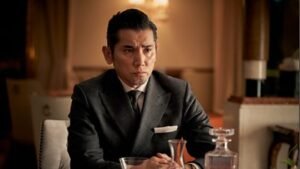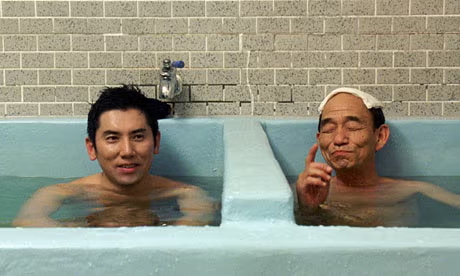Masahiro Motoki: From Traditional Roles to Modern Hits
- By -Maria Mash
- Posted on
- Posted in Actors
Masahiro Motoki, a versatile and talented actor, has carved a significant niche in Japanese cinema through his ability to seamlessly transition between traditional roles and contemporary hits. Born in 1965, Motoki has enjoyed a diverse and evolving career, gaining recognition for his dedication to the craft and his ability to bring depth and nuance to a wide range of characters. Best known internationally for his role in the Academy Award-winning film Departures (2008), Motoki’s filmography spans genres and styles, showcasing his adaptability and enduring appeal. This article explores Masahiro Motoki’s career trajectory, his notable performances, and his contributions to Japanese cinema.

Early Career and Rise to Prominence
Masahiro Motoki began his career in the entertainment industry as a member of the popular Japanese boy band Shibugakitai in the 1980s. However, his true passion lay in acting, and he soon transitioned to film and television. Motoki’s early career was marked by his work in Japanese television dramas and films, where he quickly gained a reputation for his natural talent and on-screen charisma. His breakout role came in the film Sorekara (1985), directed by Yoshimitsu Morita, where he portrayed a young man caught in a complex love triangle in Taisho-era Japan. His performance demonstrated his ability to capture emotional depth and complexity, setting the stage for his future success.
Moreover, Motoki’s early work in period dramas, such as A Homansu (1986) and Bokura no Nanokakan Senso (1988), showcased his versatility and range. He was particularly adept at portraying characters in historical settings, where he blended traditional sensibilities with a modern approach to acting. His commitment to authenticity in his roles quickly earned him critical acclaim and helped establish him as a promising young talent in the Japanese film industry.
From Traditional Roles to Modern Hits
As his career progressed, Masahiro Motoki began to explore more contemporary roles that reflected the changing landscape of Japanese cinema. In the 1990s, he took on a variety of characters that allowed him to break away from the period drama mold and delve into more modern, complex narratives. Films like Adrift in Tokyo (2007), where he plays a law student aimlessly wandering the city with a debt collector, demonstrated his ability to navigate both comedy and drama with ease. His portrayal was both quirky and heartfelt, embodying the uncertainty and malaise of modern life in Tokyo.
Additionally, Motoki’s role in the crime drama The Bird People in China (1998), directed by Takashi Miike, further highlighted his versatility. In the film, he plays a salaryman on a business trip to a remote Chinese village, where he experiences a transformative journey. This role marked a departure from his earlier, more straightforward characters and showcased his capacity for introspection and emotional depth. It also illustrated his willingness to take on unconventional roles that challenged him as an actor and pushed the boundaries of his craft.
Breakthrough with Departures
Masahiro Motoki’s career reached new heights with his role in Departures (Okuribito) (2008), directed by Yojiro Takita. The film tells the story of Daigo Kobayashi, a cellist who, after losing his job, accidentally stumbles into a new career as a “nokanshi,” a traditional Japanese ritual mortician who prepares bodies for burial. Motoki’s portrayal of Daigo is both sensitive and profound, capturing the character’s inner conflict, growth, and eventual acceptance of his unconventional path. His performance was lauded for its emotional depth, sensitivity, and humanity.
In addition, Departures won the Academy Award for Best Foreign Language Film, bringing international recognition to Japanese cinema and solidifying Motoki’s status as a leading actor. His preparation for the role was meticulous; he spent time studying the traditional Japanese art of “encoffinment” to bring authenticity and respect to the portrayal. This dedication to his craft and his ability to convey the subtleties of human emotion made his performance in Departures one of the most celebrated in Japanese film history.
Exploring Diverse Genres and Expanding Horizons
After the success of Departures, Masahiro Motoki continued to explore a variety of roles that challenged him artistically. His film choices ranged from psychological thrillers to introspective dramas, highlighting his commitment to pushing boundaries and taking on complex characters. In The Emperor in August (2015), a historical drama set during the final days of World War II, Motoki played Emperor Hirohito’s chamberlain, showcasing his ability to handle weighty historical subjects with sensitivity and nuance.
Furthermore, Motoki’s role in The Detective Is in the Bar (2011) series allowed him to venture into the detective noir genre, where he delivered a captivating performance as an investigator navigating the gritty underworld of Tokyo. His versatility is evident in how he seamlessly moves between genres, whether it’s playing a sensitive undertaker, a weary detective, or a tormented historical figure. His adaptability and range have made him one of Japan’s most respected actors.
Contributions to Japanese Cinema
Masahiro Motoki’s contributions to Japanese cinema go beyond his performances. He is known for his deep understanding of the film medium and his commitment to artistic integrity. His choices often reflect a desire to explore stories that delve into the human experience, bridging traditional and contemporary themes. Motoki’s willingness to take risks and his dedication to his craft have inspired both his peers and younger generations of actors.
Additionally, Motoki’s impact is evident in how he has brought international attention to Japanese cinema through his work. Films like Departures have introduced global audiences to the depth and beauty of Japanese storytelling, opening doors for other Japanese films and filmmakers on the world stage. His career exemplifies the richness of Japanese cinema, where tradition and modernity coexist and complement each other.
Enduring Legacy and Future Endeavors
Masahiro Motoki’s legacy as a distinguished actor in Japanese cinema is defined by his ability to evolve with the times while staying true to his craft. As he continues to act in new and challenging roles, Motoki remains a respected figure who consistently delivers compelling and nuanced performances. His passion for storytelling and his dedication to exploring diverse narratives ensure that his work will continue to resonate with audiences for years to come.
Looking ahead, Motoki’s future endeavors are highly anticipated by fans and critics alike. As he continues to explore different genres and characters, his commitment to artistic excellence will undoubtedly lead to more memorable performances that further solidify his place in the annals of Japanese cinema.
Conclusion
In summary, Masahiro Motoki’s career, marked by a dynamic range of roles from traditional to modern hits, showcases his versatility, dedication, and passion for acting. From his early work in Japanese period dramas to his acclaimed role in Departures and beyond, Motoki has consistently delivered performances that are both profound and engaging. His contributions to Japanese cinema have paved the way for more diverse storytelling and have brought greater international recognition to Japanese films. As a pioneering actor who continually reinvents himself, Motoki’s enduring impact on the film industry remains undeniable.



